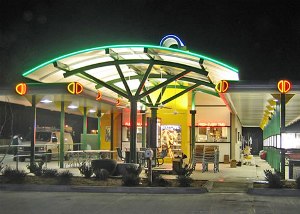Jul 27 2010
Commercial building owners and operators have long embraced the aesthetic beauty and sheltering benefits of fabric awnings, but the energy saving potential is creating renewed interest.
"Awnings have long been used commercially for promotion, and to provide shade and cover," says Michelle Sahlin, Managing Director of the Professional Awning Manufacturers Association (PAMA). "Today, the push for improved green building practices is leading organizations to an even greater appreciation of awnings."
A new video, "Awnings Provide Successful Solutions for Commercial Buildings," introduced by PAMA, highlights the wide spectrum of benefits fabric awnings provide.
Enhance brand, visibility and revenue potential
 Commercial awnings
Commercial awnings
For restaurants and retail operations, visibility is critical. "One of the things that is important with this facility, and with any facility you have, is to ensure that people can find you," says Dan Linnen, Owner of the Andiamo Restaurant in Novi, Michigan. "Awnings help set the building off, and we use them often as an icon."
In addition to the branding benefits, Andiamo also built a fabric awning structure to significantly expand seating capacity and generate additional revenue. "The payback… was really a short time…four weeks," reports Linnen. "We found that the awnings were a much better application for our use…than that of traditional construction."
Cut energy costs and contribute to LEED certification
Bazzani Associates, an established green building firm in Grand Rapids, MI, is passionate about historic preservation and urban renewal. "If you are not building a green building, you are building an obsolete building," says Guy Bazzani, President.
The Bazzani office, a historic building built in 1918, has earned LEED certification. "Awnings contributed to our LEED energy and atmosphere credits. We lowered our cooling costs… We suspect the awnings give us about 11 percent better performance in the summer months by controlling sunlight."
Add cost-effective safety, comfort and convenience
After a vehicle lost control, crashed into Providence Hospital in Detroit, MI, destroying part of the emergency room area, Joe Serra, Plant Operations Manager, needed a quick, safe and cost-effective solution for the hospital's patient discharge area.
"We had to come up with some kind of design to facilitate security… the weather, and also to have a nice comfortable place… for our patients being discharged," says Serra.
"If you look at [the awning] you'll see where it's compartmentalized… We have heat in there. It's very comfortable, even when it's down in the teens."
What Serra appreciates most about the new awning is how seamlessly it integrates into the hospital facilities. "It serves its functions. It's been very advantageous for us."
Source: http://www.awninginfo.com/